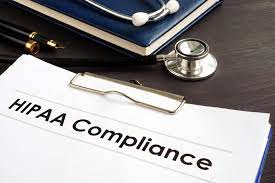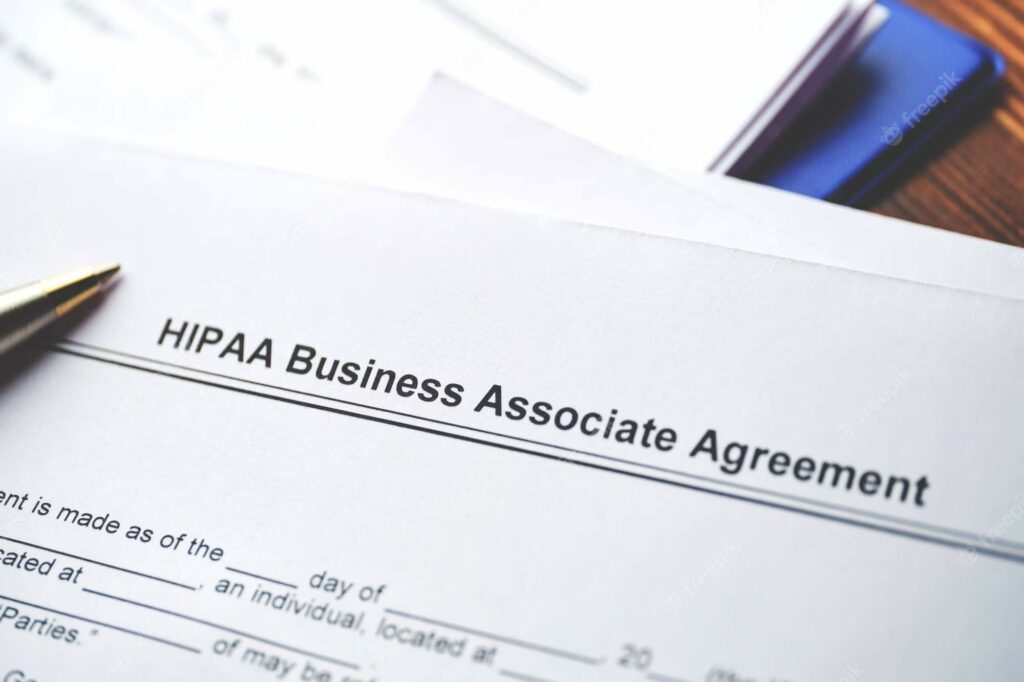As a healthcare provider or business that handles protected health information (PHI), it’s essential to have a HIPAA Business Associate Agreement in place with any third-party vendors or contractors you work with. This agreement ensures that your business associates are also responsible for maintaining the privacy and security of patient data. That’s where our blog comes in.
We’ll explain all you need to know about the HIPAA BAA in this blog article, from what it is to how to assure compliance. By the end, you’ll know exactly how to safeguard the private information of both your clients and your company. Let’s begin.
Contents
- 1 What Is A Business Associate Agreement?
- 2 Who Needs A Business Associate Agreement?
- 3 What Should A Business Associate Agreement Include?
- 4 Tips For Creating A Business Associate Agreement
- 5 What Happens If A Business Associate Agreement Is Violated?
- 6 Penalties For Noncompliance With A Business Associate Agreement
- 7 Conclusion
What Is A Business Associate Agreement?
 A Business Associate Agreement (BAA) is a contractual agreement between a Covered Entity and a Business Associate that outlines the specific requirements for protecting PHI. The HIPAA Security Rule mandates that a BAA be in place whenever PHI is shared between a CE and a BA.
A Business Associate Agreement (BAA) is a contractual agreement between a Covered Entity and a Business Associate that outlines the specific requirements for protecting PHI. The HIPAA Security Rule mandates that a BAA be in place whenever PHI is shared between a CE and a BA.
This agreement serves as a legally binding document that defines the responsibilities of both the Covered Entity and the Business Associate with respect to the handling of PHI. This includes the permissible uses and disclosures of PHI, the safeguards that must be in place to protect PHI, and the consequences for non-compliance with the agreement.
Who Needs A Business Associate Agreement?
Not all businesses that handle Protected Health Information (PHI) are required to establish Business Associate Agreements (BAAs) in place with their business associates under HIPAA regulations. Specifically, HIPAA mandates that only certain entities, known as “covered entities,” must create BAAs. These entities include:
- Health plans: These refer to groups or individuals that pay or provide for the cost of medical care.
- Healthcare clearinghouses: These are public or private entities that process health information received from another entity. Examples include repricing companies, billing services, community health information systems, and “value-added” switches and networks that facilitate the processing of health information, particularly in nonstandard formats.
- Healthcare providers: These are entities that submit or transmit any health information for transactions with HHS standards.
- Hybrid entities: These refer to organizations such as universities with academic medical centers and hospitals that conduct electronic transactions for which HHS has established standards.
It’s worth noting that not all business partners working for a HIPAA-covered entity can be considered a Business Associate (BA) for the purpose of a Business Associate Agreement (BAA). Specifically, only the following individuals or entities fall under the category of HIPAA-covered Business Associates:
- Billing and coding companies
- Law firms
- IT companies
- Accounting firms
- Shredding and recycling companies
- Medical equipment companies
If you are unsure whether your organization falls under the category of a covered entity or a business associate, it’s essential to consult with legal counsel or an experienced HIPAA consultant to ensure compliance with HIPAA regulations.
What Should A Business Associate Agreement Include?
 A Business Associate Agreement should include several key elements to ensure that it meets the requirements of HIPAA regulations. The following are some of the essential components that should be included in a Business Associate Agreement:
A Business Associate Agreement should include several key elements to ensure that it meets the requirements of HIPAA regulations. The following are some of the essential components that should be included in a Business Associate Agreement:
- Description of permitted and required PHI uses and disclosures by the business associate.
- A requirement for the business associate to implement appropriate safeguards to protect the confidentiality, integrity, and availability of PHI.
- A requirement for the business associate to report any PHI breaches to the covered entity.
- A requirement for the business associate to enter into Business Associate Agreements with any subcontractors that will have access to PHI.
- A provision outlining the procedures for terminating the agreement.
- Establishing protocols for the secure transmission of PHI.
- Implementing technical safeguards to protect PHI, such as encryption and access controls.
- Providing regular employee training on HIPAA and the importance of protecting PHI.
- Developing policies and procedures for incident response and disaster recovery.
- A requirement to report breaches to the covered entity without unreasonable delay.
- A requirement to report all breaches, regardless of the number of individuals affected.
- The method and timing of breach reporting.
Tips For Creating A Business Associate Agreement
To create a Business Associate Agreement, there are certain tips that can ensure that the agreement is legally enforceable and that both parties are protected. Here are some key tips to keep in mind:
Establish Basic Information
As with any legally binding agreement, you need to include basic information such as the date, the full legal names of the parties involved, and how the parties will indicate acceptance of the terms. This information helps to establish the legal validity of the agreement.
Address BAA -Specific Requirements

In addition to the basic information, a Business Associate Agreement needs to address specific requirements related to HIPAA compliance. These requirements include:
- Acknowledgment of HIPAA relevance: Clearly explain why HIPAA is relevant to the business relationship and how both parties are subject to it.
- Nature of PHI involved: Outline what PHI the business associate and its subcontractors will access.
- Permissible versus impermissible uses of PHI: Define permissible and impermissible uses of PHI as established in relevant case law, rules, and legislation.
- Liability and consequences: Include language that holds either party responsible for a breach of PHI, and outline the consequences of non-compliance with HIPAA and contract requirements.
- Safeguards for PHI: Require the business associate to implement appropriate technical, physical, and administrative safeguards according to HIPAA’s Security Rule to safeguard the integrity, confidentiality, and availability of PHI.
- Employee HIPAA training: Establish a protocol for employee HIPAA training to ensure that both parties’ employees and subcontractors are safeguarding PHI.
- Procedure for data breaches: Establish and outline procedures in case of a data breach, including how to mitigate the harm caused by malicious third parties misusing and accessing PHI.
- Procedure for returning or destroying PHI: Describe how the parties should return and destroy PHI when requested to do so.
Drafting the Agreement
When it comes to drafting the agreement, it’s important to keep the language clear and concise. Avoid using legal jargon that may confuse the parties involved. Instead, use plain language that can be easily understood by both parties.
Seek Legal Advice
If you’re not sure how to create a Business Associate Agreement that meets all legal requirements, it’s always a good idea to seek legal advice. An experienced attorney can help you navigate the complex legal landscape and ensure that your agreement is legally enforceable.
By following these tips, you can create a Business Associate Agreement that protects both parties and ensures HIPAA compliance.
What Happens If A Business Associate Agreement Is Violated?
 When a business associate agreement (BAA) is violated, the consequences can be severe for both the covered entity and the business associate.
When a business associate agreement (BAA) is violated, the consequences can be severe for both the covered entity and the business associate.
Firstly, it is crucial to identify the breach as soon as possible. When you identify the breach, the covered entity must take steps to address the breach or end the violation caused by the business associate.
To prevent violations of a Business Associate Agreement, it’s essential to ensure that all parties involved understand their obligations and responsibilities under HIPAA regulations. Covered entities and business associates should regularly review their agreements, conduct employee training on HIPAA compliance, and implement appropriate safeguards to protect PHI.
If these initial steps are unsuccessful, the covered entity must report the breach to the Department of Health and Human Services (HHS). The HHS has strict guidelines for reporting breaches, and failure to follow these guidelines can result in substantial fines.
Penalties For Noncompliance With A Business Associate Agreement
Noncompliance with a Business Associate Agreement (BAA) can lead to severe consequences for both covered entities and business associates. As a covered entity, it is essential to understand the risks and potential consequences of noncompliance with a BAA.
Financial Penalties

One of the most significant consequences of noncompliance with a BAA is financial penalties. The Office for Civil Rights (OCR) is responsible for enforcing HIPAA regulations, and they can impose hefty fines on covered entities and business associates for noncompliance. The fines can range from $100 to $50,000 per violation, depending on the severity of the violation, with a maximum penalty of $1.5 million per year for identical violations.
Reputational Damage
Noncompliance with a BAA can result in severe reputational damage for both covered entities and business associates. Data breaches and other violations can cause a loss of trust among clients, customers, and business partners. Negative publicity can quickly spread on social media, and other channels, which can significantly damage the organization’s reputation.
Loss of Business
Noncompliance with a BAA can also lead to a loss of business. Covered entities and business associates that fail to comply with HIPAA regulations can lose contracts, clients, and business partners. If an organization has noncompliance, other organizations may hesitate to do business with them, which can have long-term financial consequences.
Conclusion
In conclusion, a HIPAA Business Associate Agreement is an essential legal document that outlines the responsibilities of third-party vendors or contractors that handle protected health information (PHI). By following these guidelines, businesses can safeguard the private information of both their clients and their company and ensure compliance with HIPAA regulations.
And if you are looking to implement any of the Infosec compliance frameworks such as SOC 2 compliance, HIPAA, ISO 27001, and GDPR compliance, Impanix can help. Book a Free consultation call with our experts or email us at [email protected] for inquiries. So what are you waiting for? Start learning and growing today!
